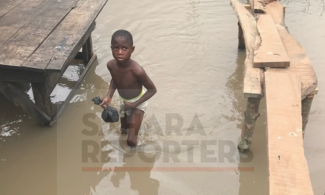
“Since the flood, the number of pupils in my school has reduced from 250 to 35. It has affected my living, my family. The school too is affected to the extent that I cannot meet up with provision of the basics; the rent, the staff salaries! I had to reduce their number because I do not want to owe my teachers. My son, who is in Yabatech, had to withdraw from school, because I could not pay. I have an aged mother, 120 years old. I cannot take care of her and I am her only male child. Every other thing has been grounded and life has become difficult, not just for me but the entire family," Olushola Olayiwola, proprietor of Trimmers Nursery and Primary School, told SaharaReporters.
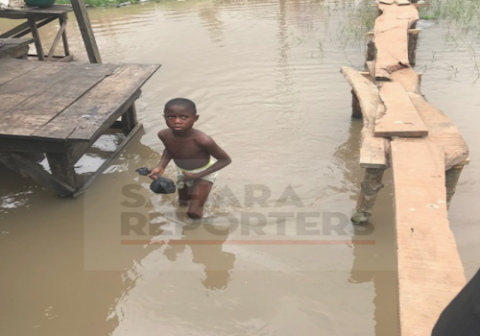
Ajegunle is a small community sandwiched between Ketu-Kosofe and Ikorodu areas of Lagos State. The well-paved road that leads to the community is a perfect mask for the poverty and anguish tucked away on both wings of the aisle.
Rotimi, a teenager who appeared to have been roaming the corners of Ajegunle barefooted, scurried out of one of the adjourning streets, kicking a plastic bottle as he would a football. He walked past this reporter but suddenly retraced his steps to get her attention.
“Aunty, aunty” he called out, “please, buy ‘pure water’ for me”, he pleaded, curling up the fingers on one of his hands and raising the fist to his mouth like a cup. It was midday, a time every child is expected to be in school but Rotimi did not appear to have been in school. His bare feet were covered in dust, almost to his knee like a pair of brown socks. He cleaned up sweat from his forehead with the back of his hands as this reporter engaged him.
He is 12 years old, he explained. “I have finished primary school at Alagbado, but my mother sent me to live here with her mother so that she can take care of my sisters.
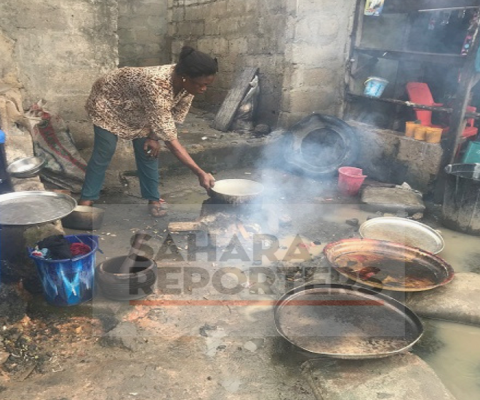

“They did not take me in Ajegunle secondary school. My mummy’s mother said she cannot pay for private school. I now learn how to make shoes but I did not go to work today because my senior said they will beat me if I come late.”
Rotimi is one of the many children in Ajegunle who have been forced out of school due to poverty and inability of their parents to meet the basic criteria required to gain admission into Lagos State public schools.
To enrol a child in any of the Lagos State primary schools, the parents or guardians are expected to have the Lagos State Residents Registration Agency (LASRRA) slip, a year’s tax clearance, and national identity card or voter card, among other important requirements.
“I sell fish. Where do I get tax paper from?” Esther, a 32-year-old mother of two, said as she ignored the reporter’s further questions on why her two children were not in school. Esther is not alone; several other parents in the community keep their children at home because they cannot afford the fee for private schools, neither do they have tax clearance.
The headmistress of Anglican Primary School, the only public primary school in Ajegunle, said she cannot disregard the state’s guidelines for admission. “That’s the state’s requirement, I cannot go outside of it,” she told SaharaReporters.
Reacting to the situation, the Public Relations office of the Lagos State Universal Basic Education Board (SUBEB), said the state gave the criteria but expects school heads to take initiative in special cases.
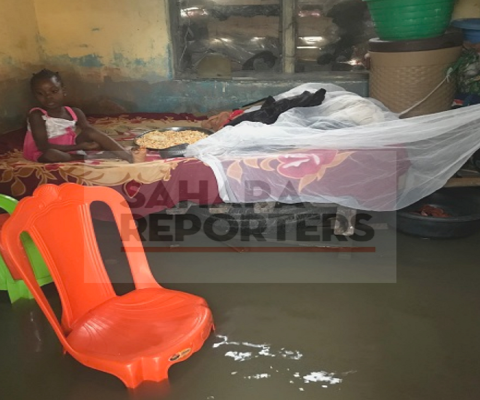
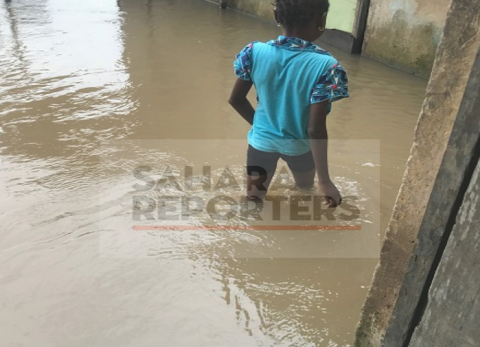
‘Willing But No Means’
Esther has made peace with her living condition. Although she wishes her children would get an education, life has thrust upon her a peasant life where she struggles to meet even the most minimal needs. “I am trying but I cannot do more than this. I left the village so that I can make money to take care of myself and my children, but things are very hard.
“I want my children to go to school. They used to go to a private school at Irawo but I can no longer pay the school fees. They have sent the two of them home since last year and they have been at home. I then say, let them go to Anglican [the only public primary school in Ajegunle], but they are asking for things I don’t have.”
Like Esther, Patience Paul also had to withdraw her two children from school following the demise of her husband.
She sold groundnut and garri, but exhausted her capital in burying her husband. The family member would not help, she told SaharaReporters.
In August 2017, Paul Johnson, a dry cleaner, came home complaining of chest pain and like a dutiful wife, Patience, on the advice of an elderly neighbor, massaged his chest with a hot towel and Robb ointment, but his condition got worse. He later died on September 7, 2017.
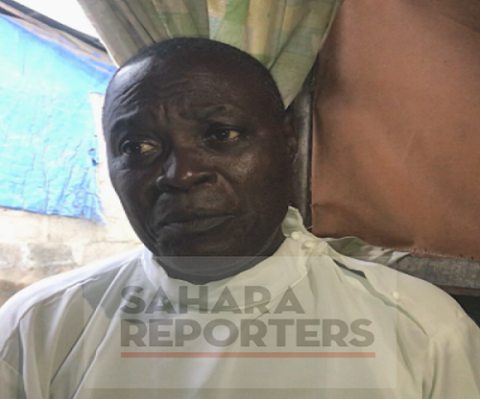
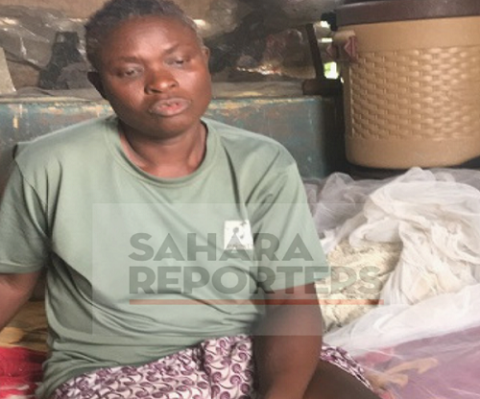
“I was asleep, when he called me around 12 midnight complaining that he couldn’t breathe. I got up that midnight and prayed for him. He got better and we slept, but in the morning, he couldn’t move. I told my neighbour who brought drugs and gave him injection but he did not get better. He called his pastor; it was the pastor who took him to Gbagada hospital, from there we were referred to Yaba hospital.
“It was at the Yaba hospital that his sister came and asked that I take him to the village. He did not want to go but I persuaded him. We travelled that night but my husband slumped in the bus and before we could get to the nearest hospital in Imo State, he died.
“The family member said I should leave his corpse for the bus to bring him to the village and go back to Lagos to look for money, but I could not leave my husband on the road. I withdrew the money I had in bank so that I could get him home.”
Patience said she expended all her savings on burial arrangements, because the family members abandoned her with her two little toddlers — Miracle (aged six) and Favour (aged four).
Miracle was taken out of school six months after his father’s death because bills were piling up with no means to meet them.
“The church pays our rent and feeds us. I cannot ask them to pay school fees again. I am trying to raise money so I can get back on my feet but it is difficult with no assistance from anyone apart from the church.
“I don’t like it that Miracle is staying at home. You know children can easily forget things. He must have forgotten all he learnt when he was in school. If my husband had not died, this would not have happened to us,” Patience said with a shaky voice, as she fought back tears.
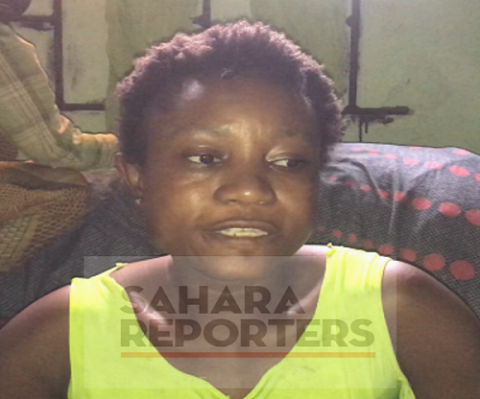
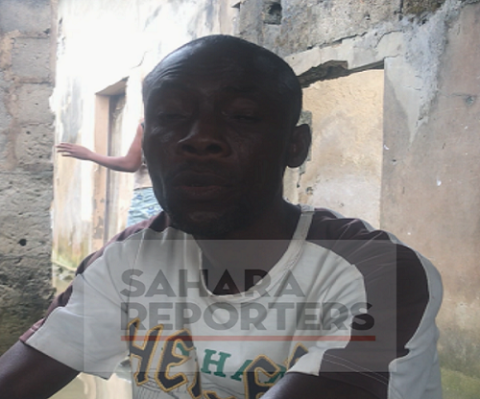
Christiana Wants School, But No Money — and Tax Clearance
Christiana, a happy-go-lucky eight-year-old, had sighted the reporter taking pictures of the scenery and was attracted like any child of her age would. She stayed close, smiling, occasionally running off and reemerging. Christiana was milking all the excitement in seeing this reporter cringe as she waddled in a pool of dirty water; she seemed accustomed to her waddling game.
Flood is one of the challenges residents in this community have become used to. For months, they are forced to live with the dirty water that takes over their rooms and streets. Some of the children, like Christiana, have come to see the flood as fun but for their parents, the situation is a harrowing yet hopeless experience. They devise means to cohabit with the flood because they have nowhere else to live. Christiana lives with her grandfather, Apostle Kehinde Oluseinde, in a church house made from wood and corrugated iron sheets. According to her grandfather, the eight-year-old has never been to school.
“There is no means [to send her to school] and I tried public school. I don’t have what they are asking for; they are asking for tax clearance, where do I get that from? I don’t have a job. They asked me to bring LASRRA slip. I was on a queue for more than one week, and I could not get it. Those are the challenges I have, and I cannot afford private school,” he said.
Christiana said she wants to go to school but would not mind if she’s left to play around all day like her other contemporaries in the community. “Jumoke too does not go to school,” she said. The toddler is yet to understand the importance of education and her grandfather who knows is incapacitated by lack of funds — and tax clearance.
A Teen Breadwinner
Johnson Taoshe is 15 years old but he carries burdens way too heavy for his mental and physical strength. He is the breadwinner of his family of four — himself, two sisters and his 44-year-old ailing mother. On one of the afternoons SaharaReporters visited the family, Jumoke, Christiana’s friend and Johnson’s immediate sister, was on her way to meet Johnson — where he learns wood work — for money to buy kerosene for their stove.
Johnson dropped out of Ajegunle High School in Junior Secondary School one, about three years ago, because of the transportation fare to the school. Similarly, his two sisters, Jumoke (aged nine) and Precious (aged seven) dropped out of school in primary three and one, respectively.
The family had moved to Ajegunle four years ago after the mother, Oluwatoyin Taoshe, developed a strange illness. After spending all her savings to treat the undisclosed sickness, she resolved to take spiritual treatment at Apostle Oluseinde’s Celestial Church, where she has been for years.
Oluwatoyin and her three children live in a one-room apartment just at the back of the Celestial Church. Inside her apartment is flooded, while the bed is propped up with old tires and wooden frames.
“I have pleaded with their father to help me but he refused. Even if it is to rent a one-room apartment, so my children don’t have to live in water like this.
“I have been very sick, but God is gradually healing me. I cry everyday because of the challenges with sending them to school, but there has been no help, not even from their father. It saddens my heart that my children don’t go to school, but I don’t know what to do. It is highly difficult to feed myself and the kids; the father left us unattended to.
“I used to trade but since my sickness, I have stopped working. I haven’t had the strength to work or do anything anymore since last year. It was because of their school I was managing to work before, but my sickness got worse and I cannot work anymore.
“When I took them to Anglican Primary School last year, I couldn’t get all the things I was asked to bring and also because I was sick. There was nothing I could do.”
In the absence of a father, Johnson is left to care for his two sisters and their mother. Apart from the stipend he gets from his wood work, the 15-year-old breadwinner relies on tips from people he runs errands for, to supplement whatever other gifts come to their home.
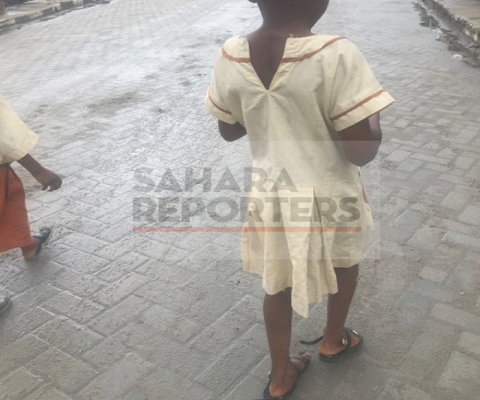
‘The Flood Has Taken our Livelihood’
When Felix Ayejuni was moving from Ijora Badia to Ajegunle three years ago, he thought he was stepping on to the next rung on the ladder of life. But six months ago, after water rented his apartment, his means of livelihood has been halted yet bills and school fees keep piling up.
Ayejuni and his wife sell smoked fish; while Felix smokes the fish, the wife hawks them but the flood has made smoking almost impossible. Worse, their customers have had to find other sellers because the road to their now-flooded home is covered in water.
“The water destroyed our means of livelihood that we have nothing to eat. In fact, we can no longer pay school fees. The school proprietors have been calling for the fees, but since I don’t have any money, there is really nothing I can do.”
In Ayejuni’s living room, his two-seater sofa is raised on a high wooden table to prevent it from getting soaked in the water that has now turned the living room into a mini pond, but he says he cannot afford to rent another apartment.
Many residents in the riverine and flood-prone parts of Ajegunle suffer the same fate biannually. The community endures financial crunch during this period but greatly affected is the education of the hundreds of children in the community. Without the added difficulties of the flood, the parents — many of whom are unable to provide three-square balanced diet — are already stretched thin to afford the basic needs required for a child to stay in school.
Olushola Olayiwola, proprietor of Trimmers Nursery and Primary School, one of the low-cost private schools in the community told SaharaReporters that the number of students who attend the school drastically reduces during the flood.
“Since the flood, the number of pupils in my school has reduced from 250 to 35. It has affected my living, my family. The school too is affected to the extent that I cannot meet up with provision of the basics; the rent, the staff salaries! I had to reduce their number because I do not want to owe my teachers.
“My son, who is in Yabatech, had to withdraw from school, because I could not pay. I have an aged mother, 120 years old. I cannot take care of her and I am her only male child. Every other thing has been grounded and life has become difficult, not just for me but the entire family.
Olayiwola believes that if he is able to sand-fill his school to redirect the flood, children will come back to his school, which will mean financial stability for him, but will also put more kids back into the classroom.
The traditional head of the community, Baale Odo Ogun, who identified himself simply as Chief Adeshina, also lamented how the flood has been a huge hindrance to the education of the children of the area.
“As a result of this water upsurge, our secondary school has had to be relocated. It’s about six plots of land wasting away because of the water. I believe sand-filling the school is not difficult to do. We continue to lose students when they go to school or they do not go to school because of the heavy traffic,” he said.
Some of the children, who managed to complete primary education despite challenges, drop out of secondary school because of their parents’ inability to meet financial demands of transportation. Godfrey and Leonard dropped out in Senior Secondary School 2 and Junior Secondary School 3, respectively, when their single mothers couldn’t afford the transportation fare to Ketu where the secondary school was relocated to.
Poor and Uneducated: Faces in the Data
Ajegunle, like other low income communities, puts a face to the statistics showing the high rate of poverty and out-of-school children in the country. A recent Brookings Institution report pitched Nigeria as the poverty capital of the world, taking over India that has six times the population of Nigeria.
The report revealed that by the end of May 2018, Nigeria “had about 87 million people in extreme poverty, compared with India’s 73 million. What is more, extreme poverty in Nigeria is growing by six people every minute, while poverty in India continues to fall”. The 87 million Nigerians living in extreme poverty represent nearly 50% of the country’s population. The figure was much scarier in 2016 when the National Bureau of Statistics (NBS) reported that about 112 million of Nigeria’s population is poor.
The poverty level also has a link with the number of out-of-school children in the community. According to the United Nations Children Fund (UNICEF), 10.5 million Nigerian children, under the age of 6-14, are out of school. UNICEF’s Deputy Representative in Nigeria, Pernille Ironside, said other sources say the number of out-of-school children is higher. Indeed, Ironside’s sources may be right because the Universal Basic Education Commission (UBEC), pushed the number over 2 million higher when it said the number has increased to 13.2 million children.
Although, fact checkers have flagged UBEC’s quoted number stating that no data supports it, with the reality of many families in Ajegunle and similar communities, it has become even clearer that not all Nigerian children are in the classroom and it is so, partly, because of poverty.
Mrs. Olubukola Adebiyi, founder of Jakin NGO, an organisation that works with vulnerable groups in Africa to overcome economic, educational and health hardships, in x-raying the impact of poverty on the number of out-of school children, said except poverty is reduced, the number of out-of-school children in Nigeria will continue to rise.
“Let’s not even focus on private schools because if you can’t pay their fees, you can’t be admitted,” she said. “On government schools, even with the free education, the uniforms are not free, the total number of books needed to run a session are not free; transport fare for the children — to and fro — is not free and even with the government’s feeding programme, it is not enough to keep the children in school in the entire country.
She explained that it would be difficult to keep children from vulnerable homes in school, as such families can barely cater for the most basic needs of the children.
“There are kids with parents who still fall within the vulnerability index by reason of unemployment of their care givers; they cannot afford to stay in proper homes or cater for the daily sustenance of the children. For such families, education is not a priority. There is no point taking a child to school, if there is no home for the child in the first place or when the child has not even eaten.
Adebiyi, whose organisation caters for vulnerable families, also opined that there is a need for the Lagos State government to make concessions for parents who are unemployed and unable to pay tax so that their children can benefit from the state’s free education system. “The government needs to be looking at tax waivers for some particular income level and vulnerable groups,” she said.
“A mother that does not have roof over her head, and probably manages to get a bag of ‘pure water’ on credit to sell, and whatever little she makes is, what she uses to feed the children, I don’t know where she will be placed on the tax radar,” Adebiyi stated, adding that children of such mothers may not consider the importance of formal education for their children.
She also urged the government to review the criteria for transfer into its schools to accommodate vulnerable families.”